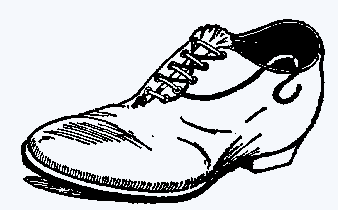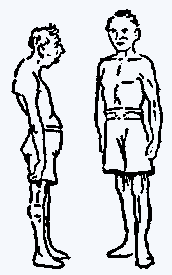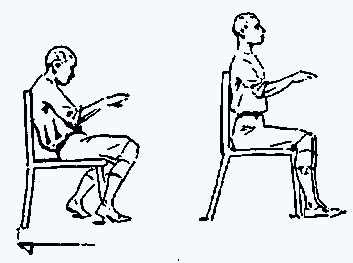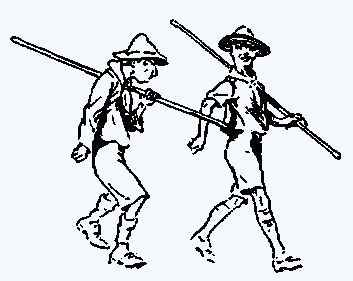Camp Fire Yarn No. 19
PREVENTION OF DISEASE
Germs, and How to Fight Them Proper Food • Clothing Troop Formations
Some years ago, when I was in Kashmir, some local inhabitants brought to me a young man
on a stretcher, who they said had fallen off a high rock, and had broken his back and was dying. I soon found that he had
only dislocated his shoulder and had got a few bruises, and seemed to think that he ought to die.
So I pulled off my shoe, sat down alongside of him facing his head, put my heel in his
arm-pit, got hold of his arm, and pulled with all my force till the bone jumped into its socket. The pain made him faint,
and his friends thought I had really killed him. But in a few minutes he recovered and found his arm was all right. Then they
thought I must be no end of a doctor, so they sent round the country for all the sick to be brought in to be cured; and I
had an awful time of it for the next two days. Cases of every kind of disease were carried in, and I had scarcely any drugs
with which to treat them, but I did the best I could, and I really believe that some of the poor creatures got better from
simply believing that I was doing them a lot of good.
But most of them were ill from being dirty and letting their wounds get poisoned with
filth; and many were ill from bad drainage, and from drinking foul water, and so on.
This I explained to the headmen of the villages, and I hope that I did some good for their
future health.
At any rate, they were most grateful, and gave me a lot of help ever afterwards in getting
good bear-hunting and also food, etc.
If I had not known a little doctoring I could have done nothing for these poor creatures.
While talking about doctoring I want to warn you against the excessive use of patent medicines
and drugs. You will find advertisements for these in many magazines and they sound like cures for all ills. Whilst some may
be quite beneficial, others can be very harmful, especially if they are taken in large quantities. So if you are ill go to
a qualified doctor rather than buy some remedy which the advertisement says will cure whatever you may think is wrong with
you.
GERMS AND HOW TO FIGHT THEM
Disease is carried about in the air and in water by tiny invisible "germs" or "microbes".
You are very apt to breathe them in through the mouth or to get them in your drink or food and to swallow them, and then they
breed disease inside you. If your blood is in really good order, it generally does not matter, no harm results. But if your
blood is out of order, these germs may make you ill.
A great point is, therefore, to abolish the germs, if possible. They like living in dark,
damp, and dirty places. And they come from bad drains, old dustbins, rotting refuse, etc. Therefore, keep your room, or your
camp, and your clothes clean, dry, and as sunny as possible, and well aired; and keep away from places that smell badly.
Before your meals you should always wash your hands and fingernails, for they are very
apt to harbour microbes which have come from anything that you may have been handling in the day.
Sleeping in Fresh Air
A Scout has to sleep a great deal in the open air anyway, therefore, when he is in a house
he sleeps with the windows as wide open as possible. If he is accustomed to sleep in a warm atmosphere he might catch cold
when he goes into camp, and nothing could be more ridiculous or more like a "tenderfoot" than a Scout with a cold in his head.
When once he is accustomed to having his windows open, he will not catch cold.
Many persons who are pale and seedy, are often made so by living in rooms where the windows
are seldom opened and the air is full of unwholesome gases or germs. Open your windows every day to let the foul air out.
FOOD
A good many illnesses come from over-eating or eating the wrong kind of food.
A Scout must know how to keep himself fit and active. Once he has got the right kind of
muscles, he can remain fit without further special exercising of those muscles, provided that he eats the right kind of food.
In the siege of Mafeking, when we were put on short rations, those of the garrison who
were accustomed to eat little at their meals, did not suffer like some people, who had been accustomed to stuff themselves
well in peace time and who became weak and irritable. Our food there towards the end was limited to a hunk of pounded-up oats,
about the size of a penny bun, which was our whole bread supply for the day, and about a pound of meat and two pints of "sowens",
a kind of stuff like paper-hangers' paste that had gone wrong.
The cheapest foods are dried peas, flour, oatmeal, potatoes, rice, macaroni, and cheese.
Other good foods are fruits, vegetables, fish, eggs, nuts, and milk, and one can live on these perfectly well with little
or no meat.
If you have lots of fresh air, food keeps you healthy. If, on the other hand, you are
sitting indoors all day, much food makes you fat and sleepy. In either case you are better for eating moderately. Still, growing
boys should not starve themselves but, at the same time, they need not be like that little hog at the school feast, who when
asked, "Can't you eat any more?" replied, "Yes, I could eat more, but I've no room to swallow it."
A great weakness nowadays is the amount of medicine which fellows dose themselves with
when there is no reason for taking any medicine at all.
The best, medicine is open air and exercise and a big cup of water in the early morning
if you are constipated, and a pint of hot water on going to bed.
FOOTWEAR
One great point that a Scout should take care about, to ensure his endurance and being
able to go on the march for a long time, is his shoes or boots. I like shoes better than boots, because they let more air
in for the feet. A Scout who gets sore feet with much walking becomes useless.
You should, therefore, take great care to have good, well-fitting, roomy boots, and fairly
stout ones, and as like the natural shape of your bare feet as possible, with a straight edge on the inside. Keep your boots
soft with lots of grease, mutton fat, dubbin, saddle soap or castor oil.
If feet are allowed to get wet, from perspiration or from outside moisture, the skin is
softened, and very soon gets blistered and rubbed raw where there is a little pressure of the boot.

Therefore, the feet should be kept as dry as possible. To do this it is necessary to wear
good woollen socks. If a man wears thin cotton or silk socks, you can tell at once that he is no walker. A fellow who goes
on a long walking trip for the first time is called a "tenderfoot", because he generally gets sore feet until by experience
he learns how to keep his feet in good order.
If your feet always perspire a good deal, it is a useful thing to powder them with powder
made of boric acid, starch, and oxide of zinc in equal parts. This powder should be rubbed in between the toes, to prevent
soft corns forming there. Your feet can be hardened to some extent by soaking them in alum and water, or salt and water. Wash
the feet every day.
DRILL FOR SCOUTS
Troop Movements
Scouts use drill to enable them to move quickly from one point to another in good order.
When done right, drill also sets them up, and makes them smart and quick. It strengthens
the muscles which support the body, and by keeping the body upright the lungs and heart get plenty of room to work, and the
inside organs are kept in the proper position for proper digestion of food.
A slouching position, on the other hand, depresses all the other organs, and prevents
them doing their work properly, so that a man in that position is generally weak and often ill.

Growing lads are very apt to slouch, and should therefore do all they can to get out of
the habit by plenty of physical exercises and drill.
Stand upright when you are standing, and when you are sitting down sit upright, with your
back well into the back part of the chair Alertness of the body, whether you are moving, standing, or sitting, means alertness
of mind, and it is a paying thing to have, because many an employer will select an alert-looking boy for work and pass over
a sloucher. When you have to stoop over writing at a table, or even tying a boot-lace, do not round your back, but tuck in
the small of your back, which helps to strengthen your body.
On the word "Alert", the Scout stands upright looking straight to his front, with both
feet together, hands hanging naturally at the sides, fingers straight.
On the word "At ease", or "Easy" he carries his left foot away six inches, and clasps
his hands behind his back and can turn his head about. At the word "Sit easy", he squats down on the ground in any position
he likes. "Sit easy" should usually be given whenever you don't want the boys to be at the "Alert", provided that the ground
is dry. On the command "Quick march"-boys move off with the left foot leading at a smart pace, swinging the arms freely, as
this gives good exercise to the body and muscles and inside organs.

On the command "Double"-boys run at a jog-trot with short, easy steps, hands swinging
loosely, not tucked up at the side.
On the command "Scout Pace"-the boys march at the quick march for twenty paces, then double
twenty paces, and so on, alternately running and walking, until the word is given "Quick march" or "Halt".
"Right turn"-each boy turns to the right.
"Follow your leader, leader right turn"-the leading man turns to his right, the remainder
move up to the place where he turned, and then follow after him.
"Front form line" (when "Following the leader")-those in rear run up and form in line
alongside the leader on his left.
Troop Formations
Line (means parties side by side)-Each Patrol has its Scouts in line, Patrol Leader on
the right, Second on the left, the others in their order from right to left, Scoutmaster in front of centre.
Open Column (means parties one behind the other)-Give the word "Patrols right wheel" (form
line). "Halt" (when exactly behind each other at their proper distance, such as will enable them to wheel either to right
or left into line).
Close Column-Rear Patrols moved up to leading Patrols for taking up less room on parade,
or for being addressed by a leader.
Line can be formed from "open column", to the right or left by wheeling the Patrols to
that hand; or to the front by the leading Patrol standing fast (or advancing), the second Patrol inclining and moving up on
its right, the third Patrol moving up into line on its left, and so on with other Patrols in rear, even numbers going up on
the right, odd numbers on the left of the leading Patrol. The Patrols which move up always do so at the "double".

Line can be formed to the rear from "open column" by "about turn" for everybody (always
turn about to the right hand), and then proceeding to form line as above.
Formations by Silent Signals
With an alert Troop these formations can easily be made without any word of command; all
that is needed is for the Scoutmaster to give a signal and every Scout immediately doubles to his proper place in his Patrol,
the whole formation facing the Scoutmaster.
For instance, for "Line" he might extend both arms outwards to the sides from the shoulder;
for "Open column" extend both arms outwards but bend them upward at the elbow; for "Close column" the signal might be like
that for "Open column" but with the arms held forward instead of outward from the shoulders.
>"Horseshoe formation" is the ordinary one for Troop parades. The signal for this is
usually to swing the arms to and fro with a semi-circular motion in front of the body.
For inter-Patrol games "Rows" is used. This means that the Patrols are in Indian file,
behind their Patrol Leaders with their Seconds at the back, facing the Scoutmaster, and in their usual Patrol order from right
to left. The usual signal is both arms stretched forward from the shoulders.
Movements by signal are always made at the run and in dead silence

